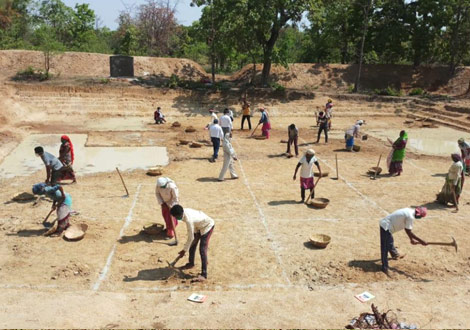Dancing in the rain amidst Covid-19
by Sneha Kaushal & Kuntal Mukherjee, Kanker
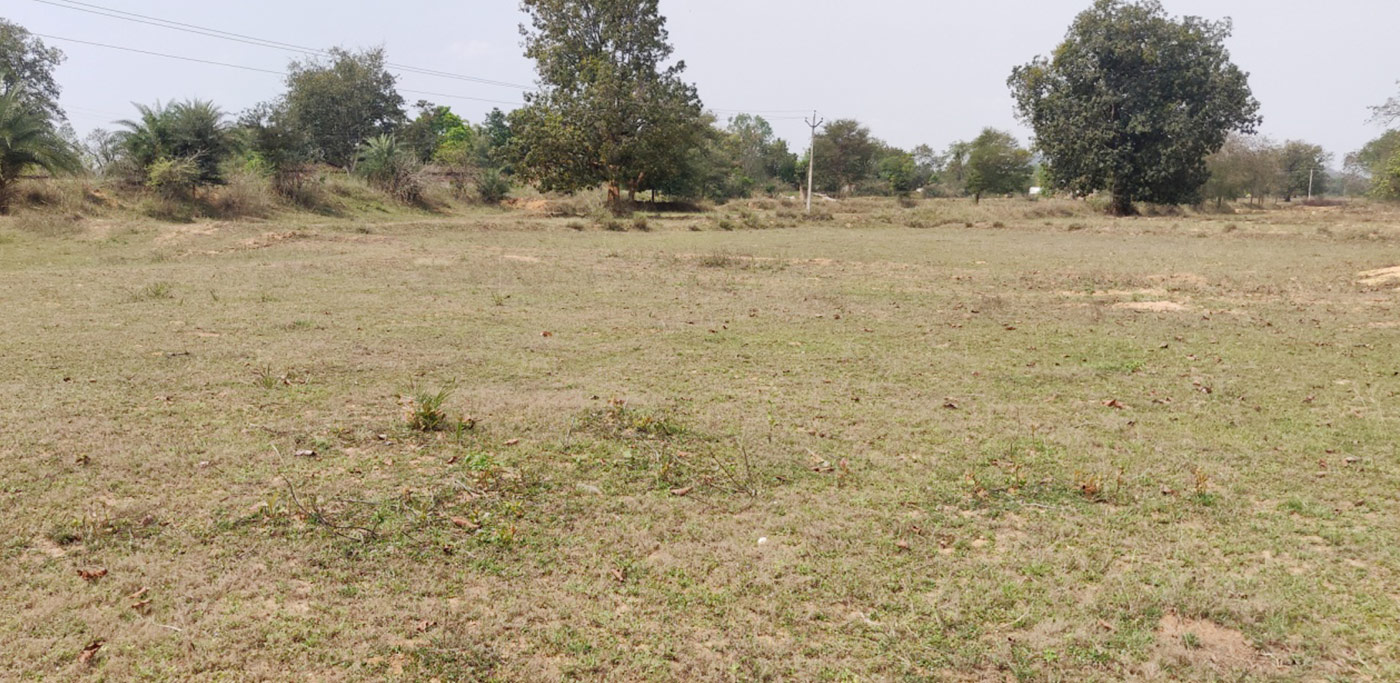
Seetabai and Balram stepped out to meet the Panchayat leader to ask when the land development work was going to start in their village. It being the end of spring in their part of Chhattisgarh, the mid-day sun of early-April was reasonably warm. Walking down the meandering lane that takes one to the main road from their cottage, Balram looked at a vast tract of undulated land, demarcated for creation of water harvesting structures in a resource planning exercise for MGNREGS done in their village a year ago. Work was supposed to start by early spring.
“How are we going to pay back our Rs. 5000 debt to the grocery shop, and buy medicines for father, if we don’t get our wages from MGNREGA work Balram?” Seetabai’s anxious voice was quivering in the dry hot air.
With a heavy heart, all that Balram could utter in response was a faint “hmm”. Like Seetabai-Balram, most of the families of Khairkheda pachayat were living in fear, apprehension, confusion and doubts and people were unsure if Gram Panchayat would let them work. And, the Panchayats were in doubt if people will turn up or not. Balram-Seetabai could not go far, they were stopped by a patrol van and the local police officials asked them to go back as the area was under total lockdown.
“Don’t you know how dangerous it is to come out on the streets these days? You can get infected by Coronavirus” retorted the officer.
“Is it more dangerous than sitting back at home and starving? How long can we sustain from the ration kits?” mumbled Balram, perplexed.
Charama, in Kanker district is a tribal dominated block. Balram and Seetabai, Sushila and Santuram, Malti and Uttam, Sanjay and Sundaram are small and marginal tribal farmers who were being supported by Sahabhagi Samaj Sevi Sanstha (SSSS), Charama on improved livelihoods interventions. They tried calling the SSSS staff to arrive at a speedy solution and put an end to the uncertainties. Most of the labours were waiting for work to start but there was lack of clarity as to how it could be done without getting infected. When SSSS visited the villages to provide immediate relief in terms of food and hygiene kits, they were surrounded by the villagers – with questions and concerns writ large on their faces.
“Are we going to get our 100-days’ work? How are we going to survive without wages? These rations are going to last just about a week...what after that?”
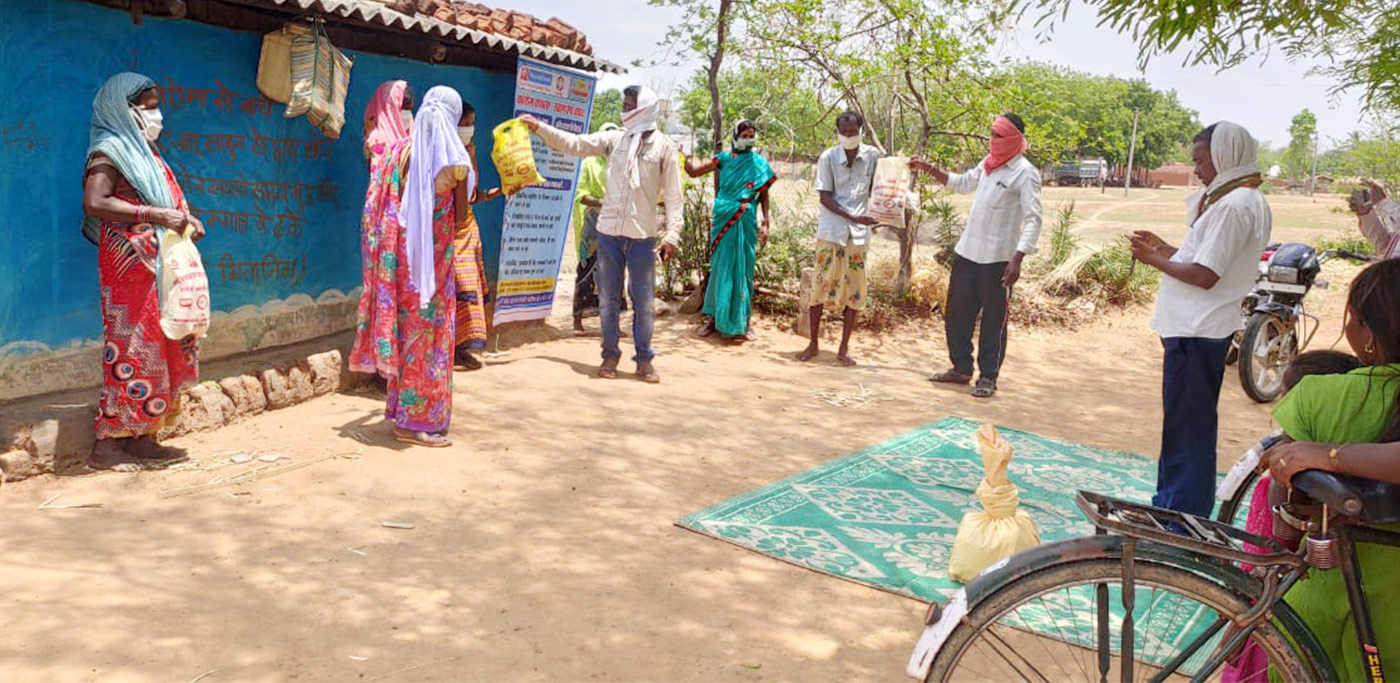
With trembling hands, the Santurams and Sushilas would take their ration kits, and walk back to their cottages stealthily. No certain response was on the cards.
The message was loud and clear for SSSS. Ration kits had to be supplemented by regular source of income. While the first was still feasible, the second seemed impossible given the stringent restrictions and the threat posed by the pandemic. They turned to their long-term partner, PRADAN for facilitation and a joint planning for handling the crisis. We have been supporting SSSS with livelihood perspective building trainings and guiding them on various nuances of ‘Organisation Development’ since 2009. SSSS initiated various rounds of discussions with the block and district administration and PRADAN. Possibilities of sanctioning land-water work under High Impact Mega Watershed Project, a joint initiative of the Government of Chhattisgarh and a consortium of Civil Society Organizations, supported by Bharat Rural Livelihood Foundation and Axis Bank Foundation, were discussed. Initiation of work, without further delay was urged upon, because every family in the remote villages of Chhattisgarh, was in dire need of cash income. The Principal Secretary, Rural Development, Government of Chhattisgarh issued a letter to districts to re-start the work, and, Rupees Five crore was sanctioned in Charama block to help 12,000 village workers start the work under MGNREGA.
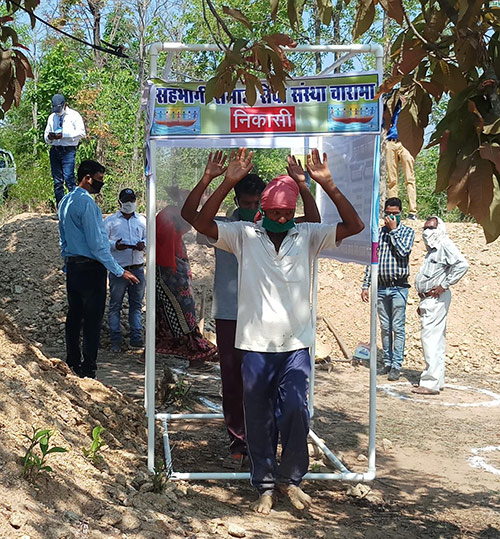
It was now equally important to build ‘model worksites’ where safety protocols would be followed. A flurry of initiatives were planned to ensure safety of each worker. Lime and bleaching powder were advised to be used for marking boundaries for workers so that social distancing could be maintained while working. Sanitization machines were to be installed at the worksites with herbal sanitizers to disinfect the workers before they started the day’s work. Also, washing hands with soap every hour and covering nose with masks at the worksites was made compulsory. All these measures had to be implemented across all the 25 worksites which we aspired to make demonstration plots.
The SSSS staff sounded off the idea to Khairkheda villagers.
“If you ensure this virus won’t affect us while we go out to work, we will join of course. We cannot see our children and ageing parents starve!”
It was a herculean task to say the least – and the lockdown made it seem more difficult. But with active help from the Zilla Panchayet Kanker, and Janpad Panchayat Charama, SSSS succeeded in installing the safety devices across all the sites.
Basant Yadav, the President of SSSS mentioned “ensuring cash income and wage employment at the doorstep is the top most priority. How to link the villagers' demand and NREGA, opening of more works in each hamlet, maintaining the social distancing norms, and proper hygiene is the way forward".
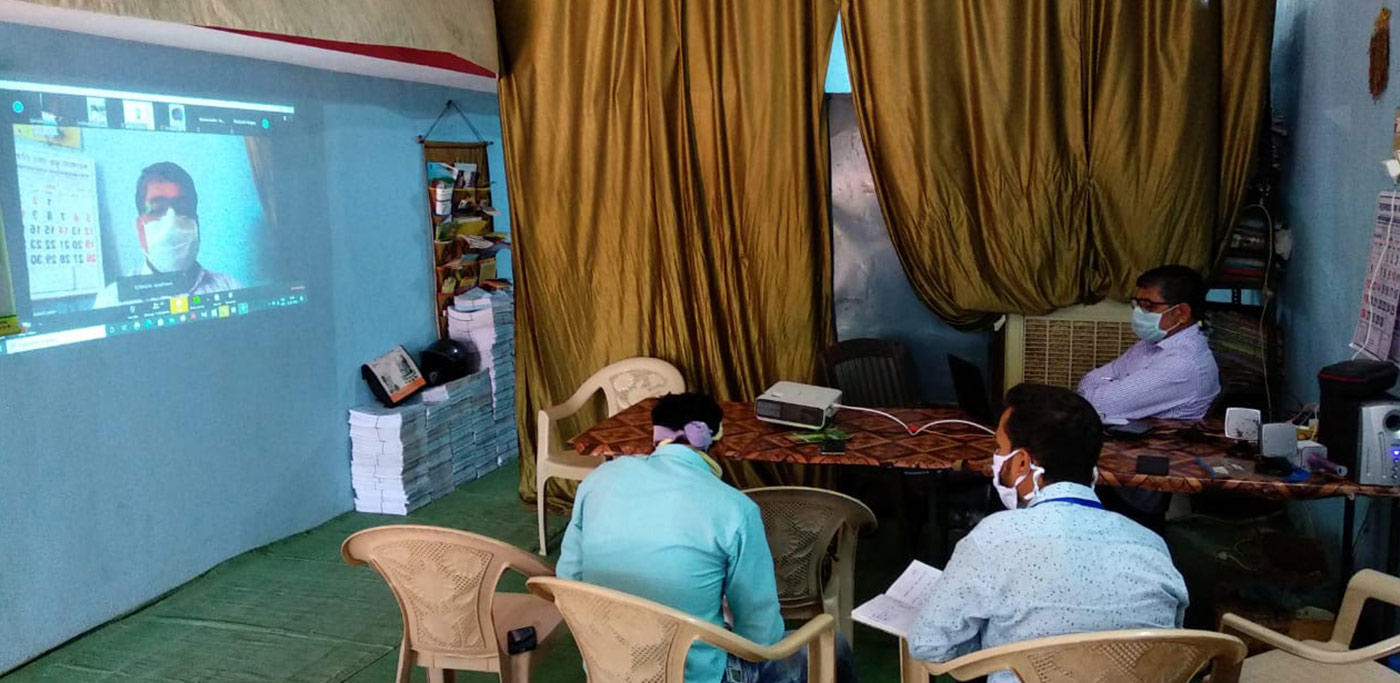
Video conferencing calls were organized in which officials from district and block, Zilla Panchayat, MGNREGA cell, SSSS, and PRADAN interacted with the workers on the worksites. Process of using sanitization machines at the workplaces was demonstrated and the workers were motivated to take all the necessary precautions while working. In addition, wall paintings were done for awareness in the villages.
“It’s a new way of working – with so many hygiene steps to be followed”
“We’ll have to keep our faces covered with masks while working – how will we breathe?”
“We will have to adapt to these new norms – we will have to stay safe and secure – that’s the key.” The villagers discussed among themselves.
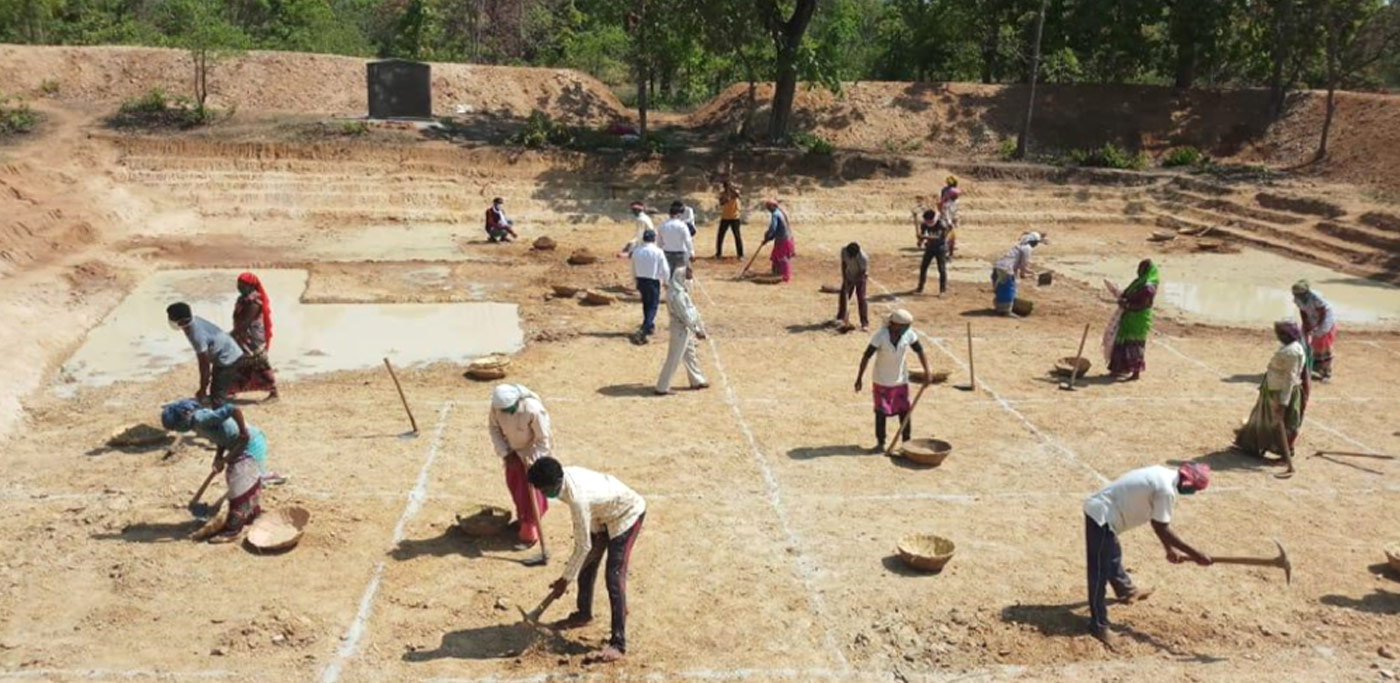
Sanjay, Malti, Santuram, Seetabai, Balram along with hundred others joined work by last week of April, once the protection equipments were installed at work place. Initially, when the work started in field, the Sarpanch of Gram Panchayat, Technical Assistant, Bare Foot Technician (BFT), Rozgar Sahayak and technical support provider, area coordinator, members of SSSS, and PRADAN to assess the sanitization measures taken. The set-up looked robust, and, SSSS could pull off all these in just about two weeks!
By the middle of May Khairkheda started receiving early-monsoon showers. That day, it was already dark outside before the sun set accompanied by strong winds. Balram returned home and went to the kitchen where Seetabai was preparing dinner. Rice and boiled potato – that was what they have been eating over the past 15 days. Balram kept a big packet next to Seetabai.
“What’s in this packet?” asked Seetabai.
“Grocery for an entire month – dal, spices, oil, tea, biscuits... And father’s medicines too!”
Seetabai’s eyes sparkled with joy as Balram listed out what all was there in the packet.
Earlier that afternoon, Balram got his payment for the MGNREGA work through Bank Sakhi and repaid all his grocery dues. Almost all the workers who had debts in local shops were able to pay back their dues from payments received from the land-water work.
With a stronger gust of wind the downpour started. Balram-Seetabai came out in the open courtyard. They had never experienced a more joyous rain dance before.
Organization: Professional Assistance for Development Action
Designation: Employment Facilitator
Number of Positions: 1
Locations: 1)Coimbatore, Tamil Nadu
PRADAN aims at providing relevant employability skills to young women from its states of operation – Odisha, Bihar, Jharkhand, Chhattisgarh- and help them get linked to appropriate employment opportunities. A major destination of employment is in the four southern states of Telangana, Andhra Pradesh, Karnataka, Tamil Nadu and Delhi NCR Region in potential sectors such as manufacturing, automotive, e-commerce, garments, textiles, hospitality, healthcare and retail industry. PRADAN is looking for a person to liaison with employers and young women who are engaged so that they work in a dignified work environment, able to retain themselves and build a long-term career for themselves. The person would be reporting to Integrator, PRADAN.
Key Deliverables:
- To liaise with the employers to ensure proper employment contracts are executed
- Take up visits to employment facilities to ensure that the conditions of employment contract are being practiced such as timely payment of remuneration, protection through insurance, PF, ESIC and other staff welfare measures, dignified working conditions, measures against harassment and discrimination, etc.
- To interact with the young women employed to understand about their welfare and sort out issues if any related to their employment
- Facilitating Life skills/ employability skills training with candidates placed in formal jobs.
- To facilitate the young women to pursue their career aspirations and arrange for their upskilling
- To liaise with skill building institutes (both public as well as private/CSR)
- To remain in contact with agencies working in the employment space to understand the scope for employment in various sector and skills in demand
- Establish strong relationships with Vendors, Outsourcing agencies, HR agencies, staffing companies and other relevant stakeholders to generate employment opportunities.
- To conduct job fairs in coordination with Employers/HR agencies and field teams.
- To conduct pre-placement, post-placement and career guidance activities with candidates.
- To support candidates in job retention.
- To document the impact of the intervention
- To represent PRADAN in meetings, events and forums in consultation with the Team Lead
QUALIFICATIONS, EXPERIENCE AND COMPETENCIES:
Education
Applicants must have Degree/Post Graduate Degree/ Diploma preferably in Social Sciences, Rural Development/ Management or equivalent, from a reputed institute.
Experience
(1) Minimum 3 to 5 years of experience in rural / urban development / skilling / employability programmes.
(2) Experience of working with employment generation programs is preferable, and not mandatory.
Skills and Competencies:
(1) Good written and oral communication skills in English and functional communication in Hindi and Tamil is preferable
(2) Excellent interpersonal skills
(3) Excellent team skills
(4) Willing to travel
COMPENSATION OFFERED
Compensation offered to the selected candidate shall be commensurate with qualifications, experience, and past salary history.
LOCATION
The job requires the person to be on the go; can operate from Coimbatore but should be willing to visit the employment facilities on a regular basis.
Founded in 1983, PRADAN has been at the forefront of innovations in rural development and has played a significant role in the design and implementation improvement of major rural development programmes. Given the deep deprivation in rural pockets, particularly among tribal and vulnerable groups, we promote sustainable livelihoods, integrated with work on issues of Gender, WASH, Health, Nutrition, Climate Change, Skilling and Governance. We currently work across 8 states, reaching out to 2.8 million households in collaboration with more than 100 NGO partners. PRADAN is an equal opportunity organisation. To learn more, please visit us at: www.pradan.net.
Position Overview:
As an Executive (Communications), the incumbent is supposed to be a knowledgeable, self-motivated and passionate individual with a creative bent of mind. The major focus area would be to promote and help flourish the practice of reflective writing and process documentation. The role involves content generation, curation, presentation and publication of articles for internal forums and external agencies including mainstream media. The person will also be responsible for organising training events for the same. Creating and implementing the media strategy to showcase PRADAN’s successes and challenges will be another key aspect of the position.
Job Description/Responsibilities
- Plan and support to produce high-quality, well-written, and visually appealing content to influence audiences: donors/partners and government agencies. Content may include blogs, articles, website content, infographics, media articles, case studies, opinion editorials, policy briefs, videos, social media content, and interactive reports.
- Cultivate and maintain relationships with key media contacts, journalists, bloggers, and influencers through PR agency.
- Oversee media outreach efforts, including pitching stories, securing press coverage, and responding to media inquiries.
- Create internal newsletters, memos, and other communications to keep employees informed and engaged.
- Plan and create marketing assets like brochures, flyers, banners, newsletters, e-mail designing for CRM, webpage designs, and donate pages.
- Identify analytical topics and co-write with concerned staff members to convert the topics into reflective long essays for knowledge creation.
- Work with other members of the communication team to implement the communication strategy across PRADAN’s programs to include both internal and external communications.
- Foster a collaborative and inclusive team culture that encourages creativity, innovation, and continuous improvement.
Qualification:
The qualifying degree is a minimum of 16 years of education (A Master’s degree in English literature, or any other social science stream).
A degree or diploma in Mass Communication from a reputed institute is preferred
- 60% and above throughout career.
- However, the applicant will be eligible if they have score between 50-59% in any one degree except the qualifying degree.
- For humanities and social science courses: 55% and above in the qualifying degree.
- Medium of instruction and examination of the last qualifying degree should be English.
Experience:
- Minimum 2 years of work experience
- Preference for candidates with experience with any media/publication or a Civil Society Organisation (CSO)
Skills and Competencies:
- Self-starter with passion to drive excellence in development sector communication
- Ability for content creation for impact stories
- Managing and creating long narrative/ reflective writing
- Handling press releases
- Ability to network well with internal and external stakeholders
- Designing emails for CRM
- Excellent written and verbal communication skills (mainly in English), with a keen attention to detail and proficiency in crafting engaging narratives
- Demonstrated history of publishing articles in media or journals
- Creative thinking and problem-solving skills, with a passion for storytelling and a knack for translating ideas into compelling content
- Knowledge of a designing software like Adobe Photoshop/InDesign is a plus
- Willing to travel extensively in remote rural India
Nature of Engagement: Regular position with a probation period of six months.
Remuneration: Based on qualification and experience the CTC would be in the range of INR 8 to 10 lakhs per annum. The CTC includes basic pay and other allowances. Apart from this, provision of deferred benefits such as PF, Gratuity, NPS, Insurance (Term life insurance, hospitalization insurance for self and dependents and accident insurance policy) are provided.
Place of posting: In PRADAN locations (possibly district town or state capital)
Selection Process:
Only short-listed candidates will be contacted. Those shortlisted will be invited to a selection process in Noida, tentatively in the first week of September 2024.
PRADAN is an equal opportunity employer. Women candidates are encouraged to apply.
Apply to:
Interested candidates with the relevant background and fulfilling the eligibility criteria are visit our website https://www.pradan.net/join-us/#careers and fill the ‘Application for Executive (Communications)’.Applications close by August 31, 2024.


